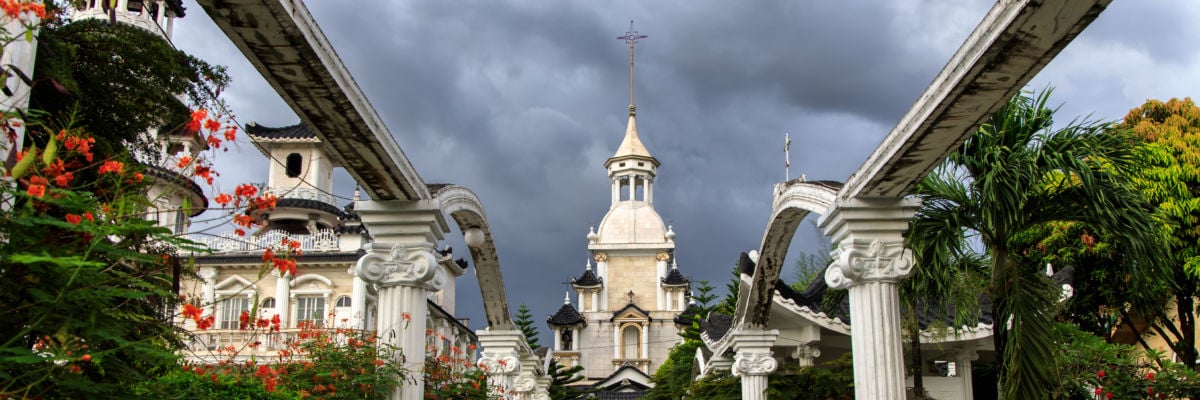
When French missionaries first set foot on Korean soil in 1836, they were not prepared for the surprise that awaited them. There they found thousands of practicing Catholics, living without sacraments and who had never seen a priest before. Among these remarkable faithful, the missionaries would help one young Korean begin his path toward holy orders—one who would, in time, be declared Korea’s first native priest and the canonized patron of the East Asian Peninsula: Andrew Kim Taegon.
In its typically mysterious ways, the Church preceded its apostles in Korea, coming some three hundred years before the Paris Foreign Mission Society at the hands of Japanese invaders, and later, from texts that were brought over by scholars from China. Many Korean people were moved to embrace Jesus Christ wholeheartedly on hearsay and hope alone. It was this extraordinary faith that characterized the early Church in Korea and that animated Korea’s first Catholic priest and saint.
Born in Chungchong Province in 1821 to parents who were Catholic converts, Kim Taegon was baptized Andrew at the age of 15, even though his father and grandfather had been put to death for adhering to Christianity. The Korean monarchy was suspicious of this Western faith and its opposition to the nation’s predominant Confucian philosophy. Catholicism was regarded as a sinister colonizing influence, and violent efforts were made to crush it.
Under these circumstances of persecution, the missionary priests sent Andrew with two companions over a thousand miles away to a seminary in Macau, China, to prepare for the priesthood. After years of study, and adventures as an interpreter aboard a French warship, Andrew was ordained a deacon in China. He then made his way back to his fatherland.
From Seoul, Andrew led a number of French missionaries to Shanghai, where the French bishop Jean-Joseph-Jean-Baptiste Ferréol ordained him the first Korean priest. Shining with zeal and fervor at the age of 25, Andrew returned to Korea with Bishop Ferréol himself to bring the gospel and Christ’s salvation to his people. He labored and ministered with joy in his home province of Chungchong until the bishop sent him on to Seoul in an effort to introduce the French missionaries from China into that region, using Chinese fishing boats to smuggle them in.
His mission was discovered by officials of the Joseon Dynasty, whose merciless clampdown on Christianity forced the faithful into hiding, but Andrew was bold in his love for Christ and Christ’s flock. He was taken to prison in Seoul, where he was tortured and finally found guilty of treason in leading a heretical cult into the country. As he awaited the executioner’s blade, Andrew Kim Taegon is reported to have cried out to those who assembled for his beheading,
This is my last hour of life, listen to me attentively: if I have held communication with foreigners, it has been for my religion and my God. It is for him that I die. My immortal life is on the point of beginning. Become Christians if you wish to be happy after death, because God has eternal chastisements in store for those who have refused to know him.
In 1984, Pope St. John Paul II canonized Andrew Kim Taegon together with Paul Chong Hasang, who laid the groundwork for the founding of a diocese in Korea, and 102 Korean martyrs. These valiant companions in Christ celebrate their feast day on September 20.
Today, we are all somewhat accustomed, at least from afar, to the longstanding tensions that entangle North Korea and South Korea and the ripple effects they produce on the world stage. The peculiar isolationism of North Korea, with its overt militaristic bluff and bluster, might be viewed as an extreme and alarming caricature of a certain Oriental self-assurance, arising paradoxically from an Asian privacy that in many, if not most, cases, is an Asian courtesy, given how much of a matter of course it is for a multitude to live in a relatively minute territory.
That attitude of charity in society and forbearance of neighbors is one that makes for good soil for Christianity. On the other hand, the defensive attitude also prevalent in such places challenges the Faith’s taking root. Today, a good deal of saber-rattling may come from Pyongyang, but the sword that Our Lord promised to bring has rattled these nations for centuries beyond any modern missile test. That sacred saber-rattling has awoken many in the East to the sun of righteousness, rising with healing in his wings.
The persecution of Catholics in the history of Asia is not as storied as it deserves to be, hidden perhaps behind that deep Eastern veil of secrecy and sanctity. But there are heroes, valiant soldiers of Christ, whose lives and deaths, though obscure, have built up a foundation of faith that has withstood the brinkmanship and pressures of oppressive dynasties whose motives often appear more calculated toward power than peace.
Christianity now has a home in Korea and, more importantly, in Korean hearts, though their struggles continue to this day. But also to this day, the blessings and bruises of Korean Catholics remain in the hands of their holy patron saint, Andrew Kim Taegon, and his fellow martyrs. As goes the ancient Korean saying, at the end of hardship comes happiness.
Image: Shrine of St. Andrew Kim Taegon at Bocaue, Bulacan, Philippines.



